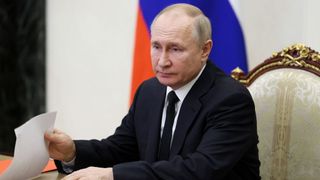'LGBT propaganda' in films, TV, games now banned for all Russians, not just minors
Putin signed the bill into law on December 5.

Russia has passed an expanded version of its law prohibiting "LGBT propaganda" in national media, including video games. Signed by Russian President Vladimir Putin last Monday, the expansion modifies a 2013 law which prohibited "The propaganda of non-traditional sexual relations" toward minors to include adults as well, effectively banning the positive portrayal of LGBT people in Russian film, TV, books, music, theatre, and games.
Individuals violating the law face fines of up to 400,000 rubles (around £5,200/$6,400), while organisations can be charged up to 5 million rubles (£64,825/$79,000). A proposal to make repeated violations of the law a criminal matter—and so subject to imprisonment—was, thankfully, rejected for now.
In mid-November, Russian politician Yana Lantratova, from the A Just Russia—For Truth party, made the media rounds with a list of specific games that contained LGBT content to gin up publicity and support for the expanded bill. On her list were games like Assassin's Creed, Life Is Strange, The Last of Us, Dragon Age, Rimworld, and more.
An amendment to the bill proposed by Lantratova, which would have banned games which promote "homosexuality, pornography, cruelty and violence" was rejected by the Duma (Russian's parliament), though only because Duma deputies felt the question should be addressed in its own bill rather than in amendments to an existing one. Videogames still face punishment if they're found to promote "non-traditional sexual relations," of course, but it looks like they can still get away with cruelty and violence for now.
It's difficult to say exactly what would and wouldn't be acceptable under the expanded law. Its vague wording and relative newness means you can't really pin down what "propaganda" means via either the text or legal precedent. A quote (via Meduza) from the Duma chairman of the Information Policy Committee, Aleksandr Khinshtein, gave the example of Oscar Wilde in an attempt to explain the scope of the law: to say "that he was an outstanding writer only thanks to his orientation, then that would be propaganda," but just "a mention of that fact in his biography" would not.
But the deputy head of Roskomnadzor, Russia's media monitoring agency, defined propaganda as the "imposition of information with the aim of forming positive distorted views on a destructive phenomenon". To me, that sounds like a far broader remit than the one suggested by Khinshtein's Wilde example, and I suspect plenty of people are going to run afoul of ungenerous interpretations of an already ungenerous law.
Activists tell The Moscow Times that representation of LGBT people is simply verboten in Russian media at this point. Others tell Reuters that, while adults-only gay bars will likely still be allowed to function, advertising and public same-sex kissing are likely to be taken as violations of the law.
The biggest gaming news, reviews and hardware deals
Keep up to date with the most important stories and the best deals, as picked by the PC Gamer team.
It is, of course, a hideous law, and if you're wondering why Russian politicians are talking about this kind of stuff rather than their ongoing and faltering war, you only need to look to their previous comments for answers. Khinshtein has been quoted as saying that "LGBT today is an element of hybrid warfare and in this hybrid warfare we must protect our values, our society and our children". In other words, it's an attempt to shore up a definable Russian nation on the pillars of (a certain interpretation of) Christian faith and social hyper-conservatism, distinct from and opposed to the west. As ever, it's only innocent people—LGBT Russians—caught in the crossfire.

One of Josh's first memories is of playing Quake 2 on the family computer when he was much too young to be doing that, and he's been irreparably game-brained ever since. His writing has been featured in Vice, Fanbyte, and the Financial Times. He'll play pretty much anything, and has written far too much on everything from visual novels to Assassin's Creed. His most profound loves are for CRPGs, immersive sims, and any game whose ambition outstrips its budget. He thinks you're all far too mean about Deus Ex: Invisible War.
Most Popular






